Warcraft Roleplaying Guide: Consent, Courtesy, and Adult Themes
The Beginners Guide to Immersing Yourself in Online Interactive Storytelling
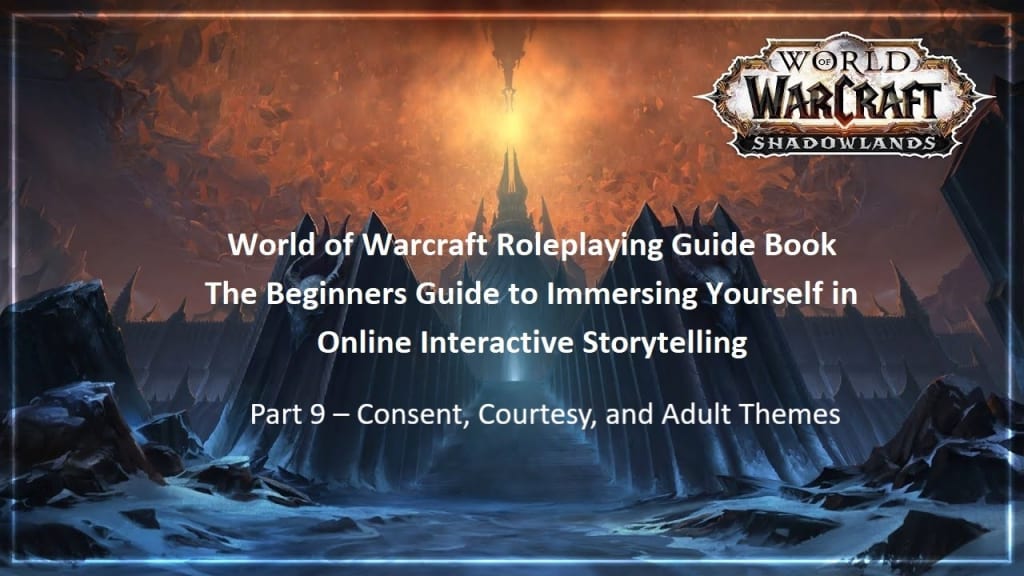
Writing is fun, whether you're doing it for yourself, or through Roleplay. I've already gone over in the previous section what sort of writing skills you should employ to be easily understood, but we're still far from finishing up.
In this section I intend to go over the most important rules of Roleplaying, and how you can use the following pointers below to maintain good relationships with everyone in your roleplay journey. I've already said several times at this point that Roleplaying is a collaborative effort, and a hobby highly dependent on your ability to connect with other people, and in this section, I intend to explain why.
After all, selfish people rarely get far in this hobby. Sure, they might get away with it for a bit, but I've been around and roleplayed long enough to know that being selfish with people and treating this hobby as a competition with other players often results in you being shunned from the community at large. A lot of beginners come into the hobby not understanding the finer points of connecting with others properly, and proper etiquette and I intend to fix that for those who are earnest and wanting to join.
So let’s get started!
First off, let me move onto the single most important Etiquette subject that you should learn as soon as possible, and should also keep in mind every time you engage another player.
Consent
Consent is key. It’s honestly one of the most important things that all Roleplayers need to remember because it’s an unwritten rule that keeps everyone happy and wanting to play with one another. Consent is the foundation of many events and storylines, and – quite honestly – touches on every single etiquette subject afterwards.
So what makes it important? Earlier in this guide, I said that people come to Roleplay for various reasons, with escapism being perhaps the biggest reason. The last thing anyone wants when logging in is having someone else dictate what happens to them and their character without any input and to have certain themes that they might not be comfortable with thrust on them without asking first if they’re alright with roleplaying those out.
How is this different from Godmoding from the previous section? The difference here is instead of dictating how the scene and story goes, it’s another player forcing themes and actions on the player without first asking if it’s alright.
Here’s an example:
Let’s say Player A is roleplaying with Player B and is having an otherwise alright time. Player A just wants some nice relaxing roleplay and isn’t interested in certain themes, scenes, and subjects. Player B suddenly brings up extremely adult topics that start to make Player A uncomfortable and starts to insinuate that their character will enact these subjects on Player A.
Now, this is a mild example, but Player B never asked Player A upfront if they were willing to roleplay those themes out, and thus, Player A will likely not be interested in interacting with Player B in the future.
After all, no one likes being told what to do and to find themselves in situations that they don’t want to be in or to do certain things without at least being prepared beforehand to do. This sort of loss of control of the narrative and the roleplay creates an easily avoidable conflict.
So how do you avoid this conflict and gain consent from the other player?
You ask. That’s really all it takes.
If there are themes, actions, scenarios, and story elements you want to explore, you simply ask the other player if it’s alright to roleplay that out. All you have to do is toss them a personal whisper and ask “Is it alright if this happens/my character does this to yours?” If they accept it, you go forward with what you’ve got planned, and if not, you respect that.
In fact, a lot of players who collaborate together on a story, event, or more work together to work out the darker details before the roleplay even happens to make sure that no one gets uncomfortable during the whole story. It’s not uncommon for players who are comfortable with each other to decide beforehand how a scene might go, or even allow other players to indulge in themes and actions that they might not be able to do with players they don’t know as well.
After all, player deaths, injuries, battles, and the like only happen when everyone is comfortable and fine with those directions and outcomes. Remember: Consent is key to Roleplay.
Courtesy
Courtesy is another Roleplay Etiquette that is important to a healthy and fun interaction. While Consent is the single most important rule to remember when it comes to all actions and outcome, Courtesy is the second most important rule to remember because it keeps things relaxed and friendly – which when we roleplay with one another is what we want.
Now, Courtesy comes in two types that I’m going to go over: Personal Courtesy, and Space Courtesy. One is more centered on how you engage with other players on both an In character and Out of Character basis, while the other showcases certain unwritten rules that most people follow when it comes to sharing space with other people.
Personal Courtesy
So what exactly is Personal Courtesy?
It’s nothing more than just being friendly, and understanding with another player; such as you would be with another person offline. That’s really all it is.
So why exactly is it considered an important Roleplay Etiquette? Mostly because people don’t really understand that concept a lot of times still. That’s not an inherent problem with Roleplaying exactly, but rather a critique on how dehumanizing our interactions with one another on the internet can be. It’s been a problem since the internet became mainstream and widely available (and even before) because the anonymous nature of the internet makes it easier to not give in to social conventions when we interact with one another.
However, the roleplay community is just that: A community. Those of us who stick around and want to build things with other players will more than likely see the same people every day, even if we don’t interact with them constantly.
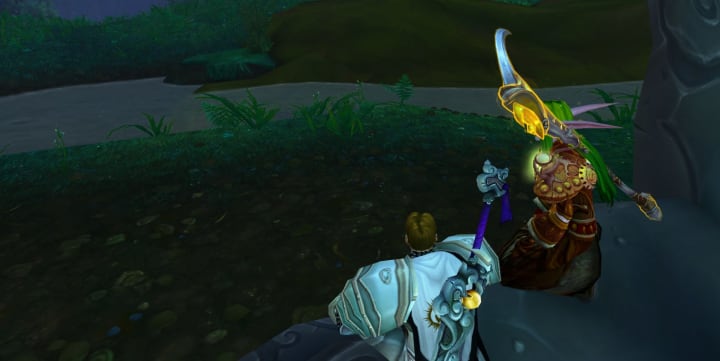
When it comes to this hobby, your reputation and how you interact with other people is extremely important, because if you have a negative reputation it could potentially lead to your own isolation as no one will want to interact with you. Likewise, a positive reputation will help you garner respect among other players and lead you to a lot of opportunities that you might not have had otherwise.
It’s usually the simple things that often have the biggest impact on our time here in this hobby. Simple things such as understanding when a player has to leave mid-scene for various reasons and not forcing players to stay on with their limited time or allowing players who walk up to you a chance to interact with you or likewise telling them you’re OOC / AFK if you really can’t Roleplay at the moment.
Plus, being Courteous on an Out of character basis can lead to you being able to successfully play more antagonistic characters as well; which I’ll be discussing in a moment.
Space Courtesy
One of the major problems that come with Roleplaying in Warcraft (and really any MMO) is that often there’s competition for some of the best Roleplaying spots. Not all areas of the world is made equal, and there’s only so much room that we have at our disposal to keep the game mechanics of the game simple enough to be enjoyable. In fact, the world that we inhabit in the game is massively small compared to what the lore of the game states it to be, but it would be impossible to render it all if it was as large as the real world.
Another major problem that comes with Roleplaying in Warcraft is that no one owns any of the space that they inhabit. You might roleplay in an apartment building in Stormwind and SAY it’s yours, but realistically there’s no way for you to claim that particular area and keep players from coming and interacting in the same area.
So what’s the etiquette exactly when it comes to Roleplaying in an area where other people want to roleplay at?
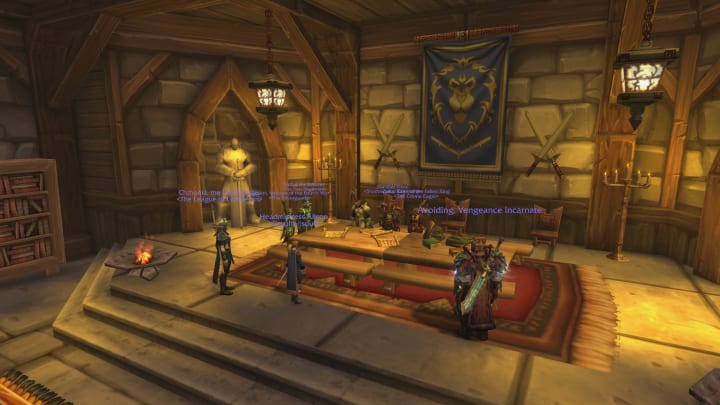
Simple: First come, first serve. That’s the general unwritten rule that most people follow. Meaning that if you and your friends want to Roleplay in a certain space, and there’s already another group that’s there, it’s rude to try and push them out of that space.
Now, this doesn’t apply to EVERY location in the game of course. Military buildings (Such as Keeps, Fortresses, and Towers) can house multiple units in them, Taverns and shops thrive off of multiple people conducting business there, and large areas (including the outdoors) can accommodate multiple people in the same area.
The general rule of thumb goes that if the area can be small and private – such as personal homes, ship interiors, farms, and other personal property – then it’s possible only one group can roleplay in that area at the moment, and the first group to utilize the area should be allowed to finish their scene there.
It’s considered extremely rude to try to force other players from an area that they’ve been utilizing as well in their Roleplay. That’s often seen as not only power gaming, but it’s a quick way to start an argument and cause drama that could ruin the evening of everyone involved.
Simply respect other players who were at the location first, and always have a backup location in mind or wait your turn.
Adult Themes
Contrary to popular belief, a lot of Roleplayers who play on World of Warcraft are adults, with the median age of most players being around their mid 20's. It's not uncommon to also see older players as old as their 30's (in fact I'm 33) and even as old as 40. Heck, there are even some players as old as 50 who roleplay.
So it’s completely understandable that a lot of players would want to engage in more mature themes that might interest them when it comes to their own personal roleplay, and want to include themes and subjects that aren't found in the game's storyline.
These themes and subjects of course can include such things as Sex, War, Death, Torture, and even other taboo subjects (that I won't mention) and are often explored by Adult Roleplayers who want to include them in their personal storylines. While not everyone is made the same, or is interested in the same things, it's not uncommon to see players experiment and try out different things from one character to another.
So I’m going to break this down into two sections: Erotic Roleplay, and Antagonism. In each section I’ll be going into detail about the appropriate etiquette for playing those sort of situations in the game and how you can not only keep yourself safe, and with a reputation intact, but also what other players expect of you when presenting those themes.
Erotic Roleplay
Erotic Roleplay – usually shortened to “ERP” – is exactly what the name suggests it is. It’s a Roleplay that involves themes of a sexual nature. While World of Warcraft itself is rated T for Teens, and doesn’t mention sex explicitly anywhere in any of the text, it’s not hard to imagine that those things DO exist in World of Warcraft considering that it’s hinted at through innuendo in the game itself.
Plus, it’s not hard to imagine that a world that’s built around the themes of War, Fighting, and Violence WOULDN’T have sexual themes. Even though it makes sense they’re not the focus of the story.
Not only that, but Roleplayers tend to make their characters a little bit of a power fantasy; not that there’s anything wrong with that. You’ll find that a majority of characters played by people tend to often be in good physical shape, are attractive, and full of boundless energy. So because of that, it’s not uncommon for players to indulge in this aspect of roleplay.
However, there are certain rules and etiquette that all players – ESPECIALLY beginners – must be aware of before you decide to engage in ERP.
First and foremost: Always be 18+. As long as you’re above the age of consent, and are legally an adult, you’re pretty much in the clear for anything being illegal.

For those that aren’t yet 18, you should never, ever engage in ERP. Not only is it illegal to do so, but it is morally wrong as well. Not only that, but you’re liable to get other players who engage in ERP with you in a lot of trouble should they be caught. Trouble that I have to emphasize is extremely illegal and frowned upon that can lead to a host of problems.
By the same token, if you're over 18 you should ALWAYS make sure that your roleplay partner (or partners) is also over the age of 18 as well. It might seem awkward to ask that question Out of Character, but it will save you a lot of trouble for yourself down the line, and prevent you from engaging in illegal activities.
Plus, asking ahead of time will also help you out if you intend to roleplay with that particular player later on and develop more scenes and stories with them.
If you’re under 18 yourself, you should never lie about your age. You don’t have to give a specific number when you’re asked about your age, but you should also be honest if you’re asked because it will keep you and anyone you’re interacting with safe. Trust me; there will be plenty of time and opportunity to engage in this kind of Roleplay when you’re an adult.
Another thing to keep in mind for roleplayers engaging in ERP is to remember consent. I already touched on that above, so I’ll simply emphasize that when it comes to ERP, consent is extremely important. If a player is fine with the characters engaging in romantic or raunchy situations but doesn’t want to roleplay that scene out (referred to as a “Fade to Black” transition) then its poor etiquette to try and guilt them into playing out scenes and situations that they don’t want to. It’s a problem that a lot of players end up committing that can get them a poor reputation, and often nearly does lead to drama.
Let me clarify a bit more: If a player does not want to engage in ERP, even if the characters you play are romantically involved, then you should never force them through any means into ERPing with you because it’s wrong to do so. A no is a no, and is not to be taken as a challenge.
The last thing to remember when it comes to ERP is to be aware of what chat modes you’re using: It's poor etiquette (and honestly, really wrong) to ERP in a public chat mode that people can see. Never ERP in open say because it’s considered an unwelcomed intrusion by other players who don’t want to see it, or shouldn’t be seeing it (such as minors, as mentioned above). It’s also against Blizzard's Terms of Service (ToS) since it violates the Teen Rating and you can jeopardize your account with it by being banned for explicit speech.
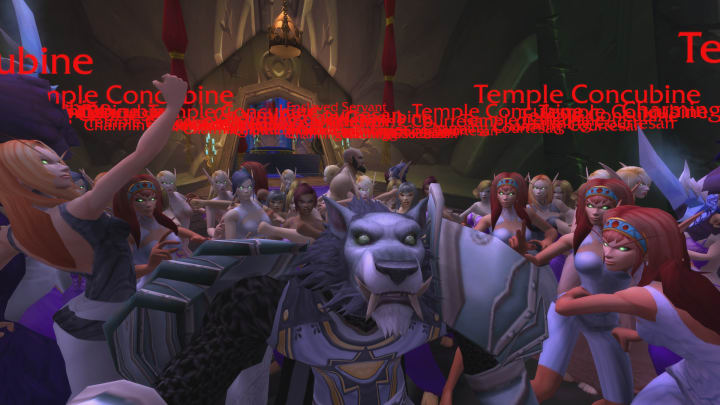
So if you do ERP, always make sure that it’s in a chat mode that other people won’t be able to see, such as Party, Whisper, Raid, or any other form of private chat between you and your partner.
Antagonism and Villainy
Let’s be honest: It’s sometimes fun to play the bad guy. Not everyone you come across is going to be a good guy who is looking out for your wellbeing, and it can even be cathartic to play a character who is less than good who gets the heroic players all riled up. In Fiction, every hero is defined by the villain, and when the villain character is written and executed well it makes the hero look even better.
When it comes to Roleplaying, everyone wants to play the hero and save the day and there’s nothing wrong with that. In fact, I play a very heroic figure as my main Roleplay character simply because I like the feeling that comes with playing someone who can be helpful to people. What draws people to villainous roleplay though is often that they want to stand out from the crowd, and give a reason FOR the heroes to do heroic things. Plus, playing a villain is often a good way to play darker themes, such as the ones I mentioned above.
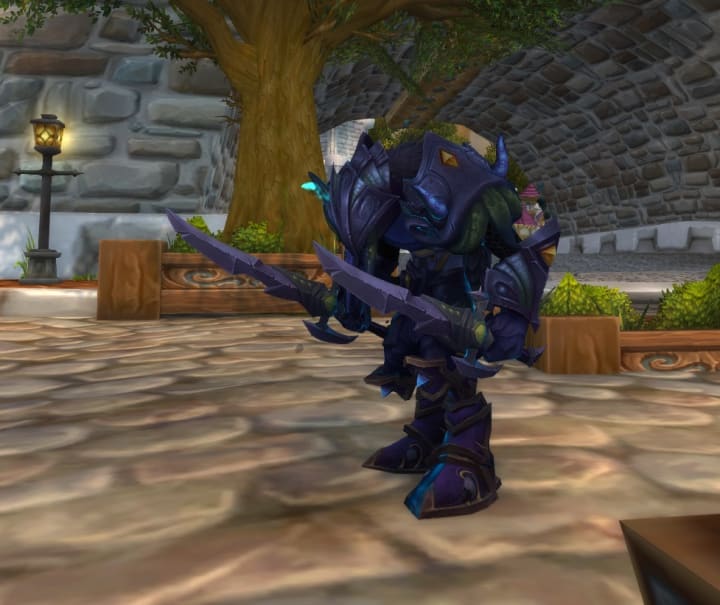
The biggest downside to playing a villain or antagonistic character though is that a lot of people tend to view them negatively. The reason for this is that a lot of beginners who come into the hobby tend to pick antagonistic roles and will often attack, harm, or disrupt roleplay without understanding proper etiquettes such as Consent and Courtesy.
Not only that, but often players will use playing a rude, evil, or downright mean character as a justification to BE rude or mean without consequence and it can be a huge turn off to people who are simply looking for positive interactions.
So what’s the etiquette on playing a villainous character correctly then, and making sure that everyone has fun?
At the most simple level, all you need to do is follow Consent and Courtesy as I outlined above. If people don’t consent to your character acting as a villain or antagonism towards them, you don’t have to make your character suddenly nice either. Mostly it’s just to avoid drawing people into roleplay that they might not be comfortable, or willing to act out.
The upside to playing a Villain is that it can enrich the roleplay when done right, and make characters' struggles all the more epic. However, the downside is that as a player you often have to work a little bit harder to make it fun, and realize that you’re quite often not going to completely win and that you’ll probably lose often. A lot of the best villainous and antagonistic characters that roleplay in the community understand their role and are willing to take a loss if it means making the story more memorable.
Also, if you are interested in playing as a Villainous character, the WoW DMing Discord has put together a very wonderful guide up for players looking to get into Villain and Evil roleplay. Simply follow the link below to read, and perhaps feel free to join the Discord as well.
Final Words
There’s certainly a lot that I talked about in this section; probably more than I’ve written in the previous sections. The reason for that is that there’s just a LOT to say when it comes to Consent, Courtesy, and Adult themes because those are pretty much the defining etiquette lessons that people need to remember when it comes to Roleplaying. Writing skill is important, yes, but you don’t need to be a good writer to be a good roleplayer as I’ve said.
It’s your ability to connect and work well with other players that make you a good Roleplayer, which is Why Consent and Courtesy are very important things to remember. If you’re known for being easy to collaborate with, you’ll find that a lot of people will come to you to roleplay, and want to collaborate with you.
However, what about those times when things just seem to fall apart? Not everyone can get along 100% of the time. Everyone gets into arguments now and then, and conflict just seems to crop up when you least expect it.
That’s what the entire purpose of the next section will be about. I'll be going over Conflict Resolution, how to handle Arguments, and how Compromise is an extremely valuable skill to learn, and what the etiquette is when it comes to all three.
So stick around and see you then!
Credits
- Big shout out to Sonceri and the WoW DMing Discord for their Villain guide, and allowing me to link it in this article; you should check them out if you’re interested in running events, storylines, and getting into collaborative events down the line.
Start of this Guide
About the Creator
Rease Archbold
Nothing more than an Indie Author with several books in the works who likes reading, writing, telling stories, relaxing, and having a good cup of coffee.
Works include themes of Fantasy, Horror, Sci-Fi, and non-fiction on the gig economy.






Comments
There are no comments for this story
Be the first to respond and start the conversation.